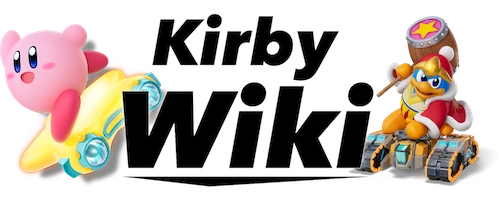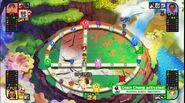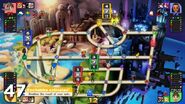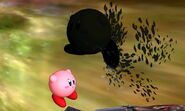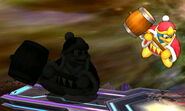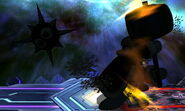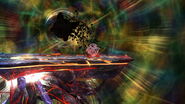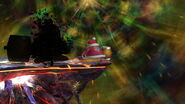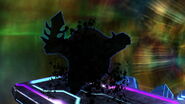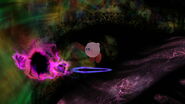(I should stop writing things at 1 in the morning) |
(I'll get back to this later) |
||
| Line 93: | Line 93: | ||
===3DS=== |
===3DS=== |
||
| − | ====Default==== |
||
* 3D Land |
* 3D Land |
||
* Arena Ferox |
* Arena Ferox |
||
| Line 130: | Line 129: | ||
===Wii U=== |
===Wii U=== |
||
| − | ====Default==== |
||
* 75m |
* 75m |
||
* Battlefield |
* Battlefield |
||
| Line 186: | Line 184: | ||
==Game Modes and Features== |
==Game Modes and Features== |
||
| + | ===Music=== |
||
| + | Music from previous [[Kirby series|''Kirby'' games]] appear for the four ''Kirby'' stages, a majority of them returning from ''Super Smash Bros. Melee'' and ''Super Smash Bros. Brawl'' and some being taken directly from certain ''Kirby'' games. The Wii U version contains a larger variety of music than the 3DS version and almost contains every music track from the 3DS version. Songs listed in bold must be unlocked. |
||
| + | *"Green Greens (Melee)" |
||
| + | *"Green Greens Ver. 2" |
||
| + | *"'''King Dedede's Theme'''" (''Brawl'') |
||
| + | *"King Dedede's Theme Ver. 2" |
||
| + | *"Green Greens" (Original) |
||
| + | *"Castle Lololo" (Original) |
||
| + | *"Float Islands" (Original) |
||
| + | *"Bubbly Clouds" (Original) |
||
| + | *"Mt. Dedede" (Original) |
||
| + | *"Ice Cream Island" |
||
| + | *"'''Butter Building'''" (''Brawl'') |
||
| + | *"Butter Building Ver. 2" |
||
| + | *"Dream Land" (''64'') |
||
| + | *"The Fountain of Dreams" (''Melee'') |
||
| + | *"Gourmet Race" (''Brawl'') |
||
| + | *"The Great Cave Offensive" |
||
| + | *"Meta Knight's Revenge" (''Brawl'') |
||
| + | *"'''Vs. Marx'''" (''Brawl'') |
||
| + | *"Planet Popstar" (Original) |
||
| + | *"02 Battle" (''Brawl'') |
||
| + | *"Forest Stage" (Original) |
||
| + | *"Celestial Valley" (Original) |
||
| + | *"Frozen Hillside" (Original) |
||
| + | *"The Legendary Air Ride Machine" (''Brawl'') |
||
| + | *"Forest/Nature Area" |
||
| + | *"'''Squeak Squad Theme'''" (''Brawl'') |
||
| + | *"Boss Theme Medley" (''Brawl'') |
||
| + | *"The Adventure Begins" (Original) |
||
| + | *"Through the Forest" (Original) |
||
| + | *"Floral Fields" (Original) |
||
| + | *"The World to Win" (Original) |
||
| + | |||
===Equipment=== |
===Equipment=== |
||
Equipment are items that are used to improve a fighter's Attack, Speed, and Defense. Many pieces of equipment have Bonus Effects added to them which are either positive or negative. Equipment with negative Bonus Effects tend to have higher boosts. There is one Bonus Effect that allows fighters to start the battle equipped with the [[Star Rod]]. Increasing one stat, however, will decrease another. Increasing Attack decreases Defense, increasing Defense decreases Speed, and increasing Speed decreases Attack. |
Equipment are items that are used to improve a fighter's Attack, Speed, and Defense. Many pieces of equipment have Bonus Effects added to them which are either positive or negative. Equipment with negative Bonus Effects tend to have higher boosts. There is one Bonus Effect that allows fighters to start the battle equipped with the [[Star Rod]]. Increasing one stat, however, will decrease another. Increasing Attack decreases Defense, increasing Defense decreases Speed, and increasing Speed decreases Attack. |
||
Revision as of 04:49, 9 July 2019
Super Smash Bros. for Nintendo 3DS and Wii U are the fourth and fifth installments in the Super Smash Bros. series, released on both the Nintendo 3DS and Wii U.[3] Super Smash Bros. for Nintendo 3DS was released for the Nintendo 3DS on September 13, 2014, in Japan, and on October 3, 2014, in North America and Europe; Super Smash Bros. for Wii U was released for Wii U on November 21, 2014, in North America, November 28, 2014, in Europe, November 29, 2014, in Australia, and December 6, 2014, in Japan. Super Smash Bros. for Nintendo 3DS is the first Super Smash Bros. title to be released on a Nintendo handheld device. As with previous installments, the premise of these titles are that characters from various Nintendo video games do battle with each other. Third party characters, such as Mega Man and Sonic the Hedgehog, are also featured in these installments. The Smash Ball item from Super Smash Bros. Brawl returns, allowing characters to perform unique and extremely powerful Final Smashes.
Playable Characters
The playable characters from the Kirby series are Kirby, King Dedede, and Meta Knight.
Default Characters
Here is a list of playable characters. The roster is identical between both versions, although the default rosters and unlockable characters are different.
- Bowser
- Bowser Jr. (Koopalings) (Wii U)
- Captain Falcon
- Charizard
- Diddy Kong
- Donkey Kong
- Fox
- Ganondorf (Wii U)
- Greninja
- Ike
- Jigglypuff (Wii U)
- King Dedede
- Kirby
- Palutena
- Link
- Little Mac
- Lucario
- Luigi
- Mario
- Marth
- Mega Man
- Meta Knight
- Mii Brawler
- Mii Gunner
- Mii Swordsman
- Ness (Wii U)
- Pac-Man
- Peach
- Pikachu
- Olimar/Alph
- Pit
- Robin
- Rosalina & Luma
- Samus
- Sheik
- Shulk
- Sonic
- Toon Link
- Villager
- Wii Fit Trainer
- Yoshi
- Zelda
- Zero Suit Samus
Unlockable Characters
- Bowser Jr. (3DS)
- Dark Pit
- Dr. Mario
- Duck Hunt
- Falco
- Ganondorf (3DS)
- Jigglypuff (3DS)
- Lucina
- Mr. Game & Watch
- Ness (3DS)
- R.O.B.
- Wario
Downloadable Characters
- Mewtwo
- Lucas
- Ryu
- Roy
- Cloud
- Corrin
- Bayonetta
Stages
Here is a list of the stages in Super Smash Bros. for Nintendo 3DS and Super Smash Bros. for Wii U. Several stages from the past Super Smash Bros. games return. Additionally, in the Wii U version, the stage creator has also returned, allowing players to create their own stages. Each stage that can be bought as DLC can be purchased for both versions.
3DS
- 3D Land
- Arena Ferox
- Balloon Fight
- Battlefield
- Boxing Ring
- Brinstar
- Corneria
- Distant Planet
- Dream Land
- Duck Hunt
- Final Destination
- Find Mii
- Flat Zone 2
- Gaur Plain
- Gerudo Valley
- Golden Plains
- Green Hill Zone
- Jungle Japes
- Living Room
- Magicant
- Mute City
- Pac-Maze
- Paper Mario
- PictoChat 2
- Prism Tower
- Rainbow Road
- Reset Bomb Forest
- Spirit Train
- Tomodachi Life
- Tortimer Island
- Unova Pokemon League
- Warioware Inc.
- Wily Castle
- Yoshi's Island
Wii U
- 75m
- Battlefield
- Big Battlefield
- Bridge of Elden
- Boxing Ring
- Castle Siege
- Coliseum
- Delfino Plaza
- Final Destination
- Gamer
- Garden of Hope
- Gaur Plain
- Halberd
- Jungle Hijinx
- Kalos Pokémon League
- Kongo Jungle 64
- Luigi's Mansion
- Lylat Cruise
- Mario Circuit
- Mario Circuit (Brawl)
- Mario Galaxy
- Miiverse
- Mushroom Kingdom U
- Norfair
- Onett
- Orbital Gate Assault
- Pac-Land
- Palutena's Temple
- Pilot Wings
- Port Town Aero Dive
- Pyrosphere
- Skyloft
- Skyworld
- Smashville
- The Great Cave Offensive
- Town and City
- Wii Fit Studio
- Wily Castle
- Windy Hill
- Wrecking Crew
- Woolly World
- Wuhu Island
- Yoshi's Island (Melee)
Downloadable Stages
- Suzaku Castle
- Dream Land (64)
- Peach's Castle (64)
- Hyrule Castle (64)
- Super Mario Maker
- Pirate Ship
- Midgar
- Umbra Clock Tower
Game Modes and Features
Music
Music from previous Kirby games appear for the four Kirby stages, a majority of them returning from Super Smash Bros. Melee and Super Smash Bros. Brawl and some being taken directly from certain Kirby games. The Wii U version contains a larger variety of music than the 3DS version and almost contains every music track from the 3DS version. Songs listed in bold must be unlocked.
- "Green Greens (Melee)"
- "Green Greens Ver. 2"
- "King Dedede's Theme" (Brawl)
- "King Dedede's Theme Ver. 2"
- "Green Greens" (Original)
- "Castle Lololo" (Original)
- "Float Islands" (Original)
- "Bubbly Clouds" (Original)
- "Mt. Dedede" (Original)
- "Ice Cream Island"
- "Butter Building" (Brawl)
- "Butter Building Ver. 2"
- "Dream Land" (64)
- "The Fountain of Dreams" (Melee)
- "Gourmet Race" (Brawl)
- "The Great Cave Offensive"
- "Meta Knight's Revenge" (Brawl)
- "Vs. Marx" (Brawl)
- "Planet Popstar" (Original)
- "02 Battle" (Brawl)
- "Forest Stage" (Original)
- "Celestial Valley" (Original)
- "Frozen Hillside" (Original)
- "The Legendary Air Ride Machine" (Brawl)
- "Forest/Nature Area"
- "Squeak Squad Theme" (Brawl)
- "Boss Theme Medley" (Brawl)
- "The Adventure Begins" (Original)
- "Through the Forest" (Original)
- "Floral Fields" (Original)
- "The World to Win" (Original)
Equipment
Equipment are items that are used to improve a fighter's Attack, Speed, and Defense. Many pieces of equipment have Bonus Effects added to them which are either positive or negative. Equipment with negative Bonus Effects tend to have higher boosts. There is one Bonus Effect that allows fighters to start the battle equipped with the Star Rod. Increasing one stat, however, will decrease another. Increasing Attack decreases Defense, increasing Defense decreases Speed, and increasing Speed decreases Attack.
Below is a list of every standard-type equipment worn by members of the Kirby series. Orange represents Attack, blue represents Defense, and green represents Speed.
| Name | Type | Image | Used by |
|---|---|---|---|
| Brawn Badge |
|

|
Anyone |
| Hammer |
|

|
King Dedede |
| Lollipop |
|
Kirby | |
| Coat |
|

|
King Dedede, Robin |
| Mask |
|

|
Meta Knight |
| Protection Badge |
|

|
Anyone |
| Agility Badge |
|

|
Anyone |
| Turbo Boost |
|

|
King Dedede, Kirby, Meta Knight |
3DS
Trophies
| Main article: Trophy (Super Smash Bros. series)#Super Smash Bros. for Nintendo 3DS |
Trophies in Super Smash Bros. for Nintendo 3DS include every character and items found in the 3DS version of Smash Bros., as well as a few miscellaneous characters and objects from the Kirby series.
Smash Run
This game contains a mode called Smash Run, exclusive to the 3DS version of the game. The mode drops up to four players in a large "dungeon-like area", where the objective is to explore, defeat enemies, and open chests in order to obtain power-ups in the span of five minutes before facing off against the other players. These enemies consist of characters from the previous Super Smash Bros. game's adventure mode, and other various Nintendo titles, such as Mario, The Legend of Zelda, Pokémon, and Kirby. This mode is meant to be similar to City Trial in Kirby Air Ride, as acknowledged by Masahiro Sakurai.
Once time runs out, a random Final Battle begins ranging from a variety of Smash battles or completing a certain objective before other players. An example of these objectives includes seeing who can KO a consecutive swarm of enemies from either the Kirby, Kid Icarus, or Super Mario series within one minute. Fighting Kirby enemies takes place on omega form Dream Land and does not include Gordo, Tac, nor Shotzo.
Enemies from the Kirby series include:
Classic Mode
Super Smash Bros. for Nintendo 3DS is the first Super Smash Bros. installment to change the gameplay of the series' Classic Mode. Instead of each stage being randomly selected throughout the whole event, players can choose one of three routes, each containing a random set of battles. Each route's difficulty is represented by a color with red as the hardest, green as the moderate, and blue as the easiest. The reward after beating a stage is based on the difficulty as well. Before starting the mode, there is an intensity setting ranging from 0.0 to 9.0 with 9.0 being the hardest. Playing the mode on 2.9 intensity or lower will result in the final battle being Master Hand. Playing on 3.0 through 7.9 intensity will split the final path from fighting Master to fighting Master Hand and Crazy Hand at the same time. However, fighting Master Hand and Crazy Hand at 5.1 intensity or higher will unleash Master Core, Master Hand's true form. At 8.0 intensity or higher, fighting Master Core is mandatory.
Master Core can take on four forms using a shadow-like material called Swarm, each being Master Giant, Master Beast, Master Sword, and Master Shadow. In its Master Shadow form, it will create a Swarm version of the player's character. Defeating its final form will reveal its core in which players have to deal enough damage to KO it and beat the mode.
Conquest
Super Smash Bros. for Nintendo 3DS has week-lasting Conquests, in which certain characters, when used in the With Anybody online mode, have earned points for weekly teams, generally based on a theme, such as colors or traits. Kirby has been part of the following conquests:
- Spherical Skirmish (won at 72% worldwide)
- Color Clash: Red, Blue, Green (11/14/2014-11/21/2014) (part of the red team "Team Diddy Kong"; 32% worldwide)
- Merry Smashmas (part of "Red Team"; won at 53% worldwide)
- Color Clash: Red, Blue, Green (12/23/2016-12/30/2016) (part of "Team Red"; won at 38% worldwide)
- What You've All Been Weighting For! (part of "Flyweights"; 44% worldwide)
- 90s Revival (part of "1990-1992"; 40% worldwide)
- Color Clash! (part of "Pink"; won at 60% worldwide)
King Dedede has been part of the following conquests:
- Battle of the Beefcakes (part of the red team "Team Donkey Kong"; 27% worldwide)
- The Quick and the Deadly (part of "Power Players"; won at 62% worldwide)
- What You've All Been Weighting For! (part of "Heavyweights"; won at 56% worldwide)
- 90s Revival (part of "1990-1992"; 40% worldwide)
- My Way or the Highway (part of "Selfish Kings"; 29% worldwide)
Meta Knight has been part of the following conquests
- Gun vs. Sword vs. Fist (part of "Swordfighters"; 29% worldwide)
- Color Clash: Red, Blue, Green (11/14/2014-11/21/2014) (part of the blue team "Team Lucario"; 33% worldwide)
- Color Clash: Red, Blue, Green (12/23/2016-12/30/2016) (part of "Team Blue"; 30% worldwide)
- 90s Revival (part of "1992-1995"; 17% worldwide)
Wii U
Trophies
| Main article: Trophy (Super Smash Bros. series)#Super Smash Bros. for Wii U |
Trophies in Super Smash Bros. for Wii U are of a larger quantity than the 3DS version as the Wii U provides more storage than that of the 3DS's. Trophies in the Wii U edition include Final Smashes, as well as many Kirby-related characters and objects, an abundance of them being Copy Abilities.
Smash Tour
Smash Tour is essentially a board game and can be played with up to four players. The objective is to collect as many fighters and stat boosts before all turns are over. Once the game concludes, the players fight in a stock battle using the fighters they collected. There are three boards: a small board, a medium board, and a large board.
Occasionally, Tac will appear on the board and will drop a massive amount of Stat Boosts if a player touches him on the board.
Classic Mode
Just like in the 3DS version, Classic Mode also had a major gameplay change where the mode is now more tournament-like. The player can choose between seven stages with each stage number going down by one after every battle. After completing six rounds, the final battle with Master Hand, Crazy Hand, and Master Core will begin depending on the intensity. Like in the 3DS version, the manner of which boss to fight depending on the intensity is identical in the Wii U version. However, defeating Master Shadow at 8.0 intensity or higher will reveal Master Core's exclusive penultimate form to the Wii U version, Master Fortress.
Master Fortress, as the name implies, is a giant fortress made of Swarm. Players must traverse inside the fortress and destroy numerous cores in three separate phases while avoiding pools of acid and Swarm versions of various enemies from Smash Run, Plasma Wisp being one of them. The acid, which can also be found on walls, can KO the player at above 100% just like the lava in The Great Cave Offensive stage. Destroying all cores will reveal Master Core who then can be KO'd to finish the mode.
Trivia
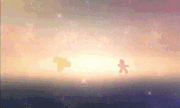
- The StreetPass Mii Plaza game, Puzzle Swap, contains a puzzle panel of Super Smash Bros. for Nintendo 3DS and Wii U featuring Kirby, King Dedede, and Meta Knight.
- Kirby's Final Smash, Ultra Sword, and Meta Knight's Galacta Knight and Dark Meta Knight colorations are the only Kirby elements in Super Smash Bros. for Nintendo 3DS that were created after Masahiro Sakurai left HAL Laboratory.
- Bandana Waddle Dee was the most voted Kirby series fighter in the Smash Bros. Fighter Ballot.[4]
